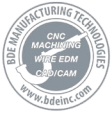Posted On: December 8, 2021
The medical industry demands a high level of precision in design when it comes to medical equipment. This equipment is used to treat several diseases and to enrich the quality of human life. The equipment features parts that can be created using different manual and automated techniques. CNC machining is one of the most popular automated machining techniques used for creating equipment parts for the medical industry. What makes this technique popular for the medical industry? This post gives 6 reasons why Computerized Numerical Controlled (CNC) machining is important in the medical industry.
6 Benefits of CNC Machining in the Medical Industry
Following are the benefits that will help in understanding the importance of CNC machining in the medical industry:
- Automated Machining Processes:
Most CNC machining processes such as CNC milling and turning, metal punching, sheet metal folding, and so on are fully automated. These processes are controlled by computers and software, which minimizes the scope of errors and assures a high level of precision.
- No Volume Restrictions:
CNC machines use computer-aided designs for the programming which helps in directing the machines to work. A CAD file can generate a cutting program that can be used to create single or multiple parts with high accuracy. With the world facing a shortage of medical equipment and components, this feature comes to aid. CNC machining helps build one-off or unique parts for surgical products, prosthetics, and medical devices and so on in short and bulk quantities.
- Quick and Multifaceted Production:
The medical industry uses equipment, appliances, and devices fitted with parts in complex geometries. Machining of these complex parts is made easier by CNC machining. Nowadays, 4-axis and 5-axis CNC machining is gaining popularity. It is an advanced method to meet any desired geometrical design in very little time. In medical industries, there are often medical emergencies that are difficult to predict but with the help of CNC machining quality parts can be provided in a short period.
- CNC Machining Requires No Additional Set Up:
Many production processes may take weeks to finish. For instance, if you are seeking plastic injection molding then mold making may take a couple of weeks, as the molds would require different optimizing parameters. This will add to production costs. However, if you are trying to build unique parts in quick turnaround times then CNC machining is the best choice. It requires no additional setup.
- Tight Tolerances:
Most medical equipment parts demand tight tolerances which can be easily achieved with CNC machines. CNC machines create surface finishes, which require no secondary finishing, and automated machining reduces the risk of deviation from the original design.
- Works with Many Materials:
Standard CNC machines can work on materials such as stainless steel, mild steel, aluminum, titanium, and so on, which are used to create different medical parts. CNC machines work on these materials precisely without affecting their accuracy and thus giving them smooth finishes.
CNC machines produce accurate machines on which the medical industry can rely upon. It’s important for medical device OEMs to partner with trusted CNC machine shops to source their parts. BDE Manufacturing Technologies is one of the popular CNC machine shops in Beaverton, Oregon, which serves clients in the medical industry. The company provides CNC milling in the medical industry and has been regularly machining parts like expandable rib cages, spinal fusion cages, bone plates, and so on.
Related Blog Posts:
 info@bdeinc.com
info@bdeinc.com 866.262.6233
866.262.6233





